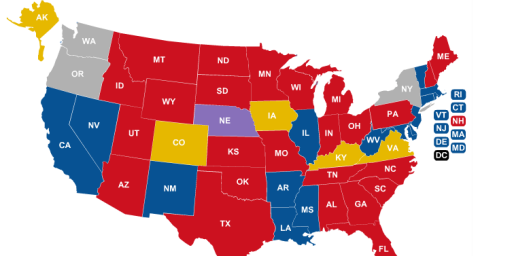Republicans Set To Make Gains In State Legislatures
Along with grabbing control of the House and making strong gains in the Senate, one of the GOP’s biggest gains came at the state level where they won a slew of Governor’s races and gained controlled of state legislatures on the eve of the post-Census redistricting battles. Now, it looks like we may see more Republican gains at the state level this year:
Four years after Republicans grabbed their largest number of legislative seats since the Great Depression, the party is positioned to gain House and Senate majorities in more states, putting energy regulation, social issues and taxes in play even as Washington remains gridlocked.
Control of five state Senates would swing to the GOP with a gain of no more than three seats, and the party is targeting four additional state legislative chambers, believing the political environment favors Republicans this year. The party already has full legislative control in 26 of the 50 states and holds 29 governorships heading into 2014 elections.
“Republicans are at something of a high-water mark,” said Tim Storey, who tracks elections at the nonpartisan National Conference of State Legislatures. “However, there are still a number of states where Republicans could flip chambers and come out even stronger than they came in.”
In Colorado, where Republicans are one seat away from control of the Senate, proposed limits on hydraulic fracturing could be curtailed. In the Nevada Senate, a Republican gain of one seat to take a majority could thwart the repeal of a constitutional ban on same-sex marriage. And if Republicans gain two seats to win control of the Iowa Senate, they are expected to push income- and corporate-tax cuts.
“Most of the key issues are taking place at the state level, and you’ll continue to see a clear course of action on the Republican side,” said Bill McCollum, chairman of the Republican State Leadership Committee and a former Florida congressman and attorney general.
Oregon, where the GOP needs two seats to gain a Senate majority, and Maine, where it needs three, are also high on the party’s target list. The more remote prospects on the party’s radar include the New Hampshire House, which has seen control flip three times in the past four elections; the Kentucky House; and both chambers in West Virginia, a state where President Barack Obama’s low approval ratings have created a particularly large burden for his party.
“Democrats are absolutely on the defensive in West Virginia,” Mr. Storey said.
Democrats, meanwhile, are looking to seize majorities in the Wisconsin, Pennsylvania and New Hampshire senates, where a gain of no more than three seats would give the party control. Michael Sargeant, executive director of the Democratic Legislative Campaign Committee, said the party also would compete for control of the Iowa House.
But nationwide, Mr. Storey said, legislative district lines generally are drawn in the Republicans’ favor, giving the party an easier time than Democrats in hitting its election targets.
After the gains of 2010, it was inevitable that the GOP would suffer some losses at the state level, of course, and even the wins they pick up won’t be quite as valuable politically as they were on the eve of the redistricting fight. Nonetheless, there are a lot of things that state legislatures are able to set the agenda on, and control at that level is worth a lot.






Interesting. “Superdestroyer” says we’re on our way toward being a one-party state, however, contrary to his opinion, it looks like it will be the Republican Party that is in charge.
That sucks. We have a pretty good idea of what it will mean if the Republicans win any more legislatures: millions wasted on pointless abortion bills, legal fights when they cut taxes and then suddenly get sued over inadequate levels of funding of education (like in Kansas), and other such fun.
@al-Ameda:
If the Democrats would just bother to appeal to middle class whites a little more, they would not have these problems. However, when the Democrats are in front of the camera arguing that Affirmative Action should be a birthright or that Americans are too stupid to compete in the global workplace, they should expect to suffer in whiter states like Iowa or New Hampshire.
Of course, state elections in 2014 are irrelevant considering the long term demographic trends in the U.S. The Democrats know that if they change the demographics enough in states like Colorado, they will gain more seats and the Republicans will fade away.